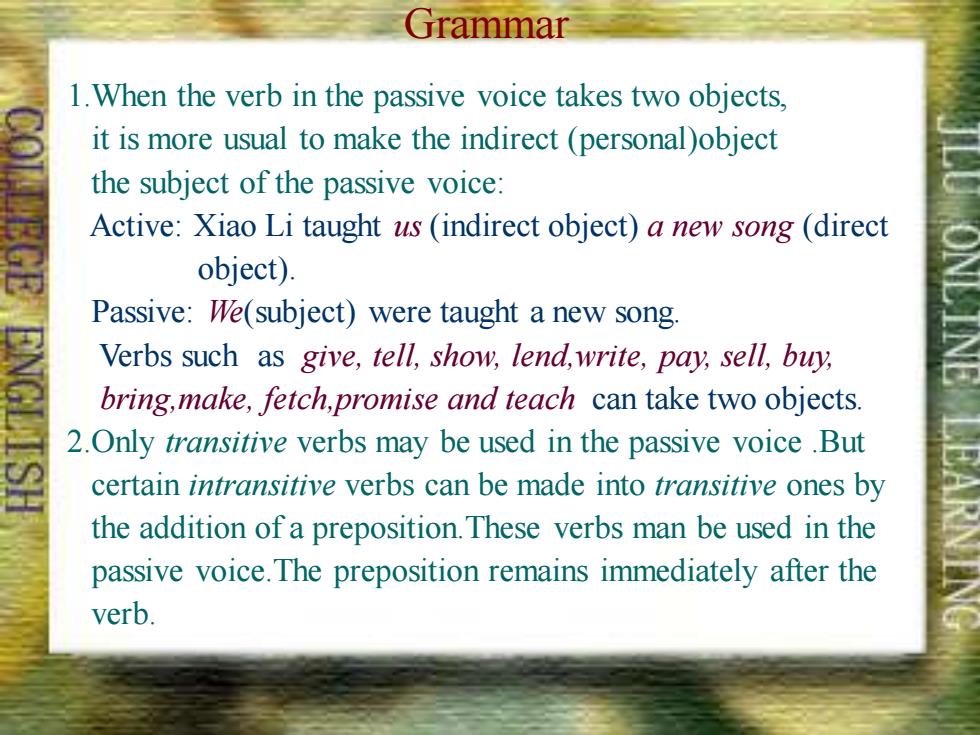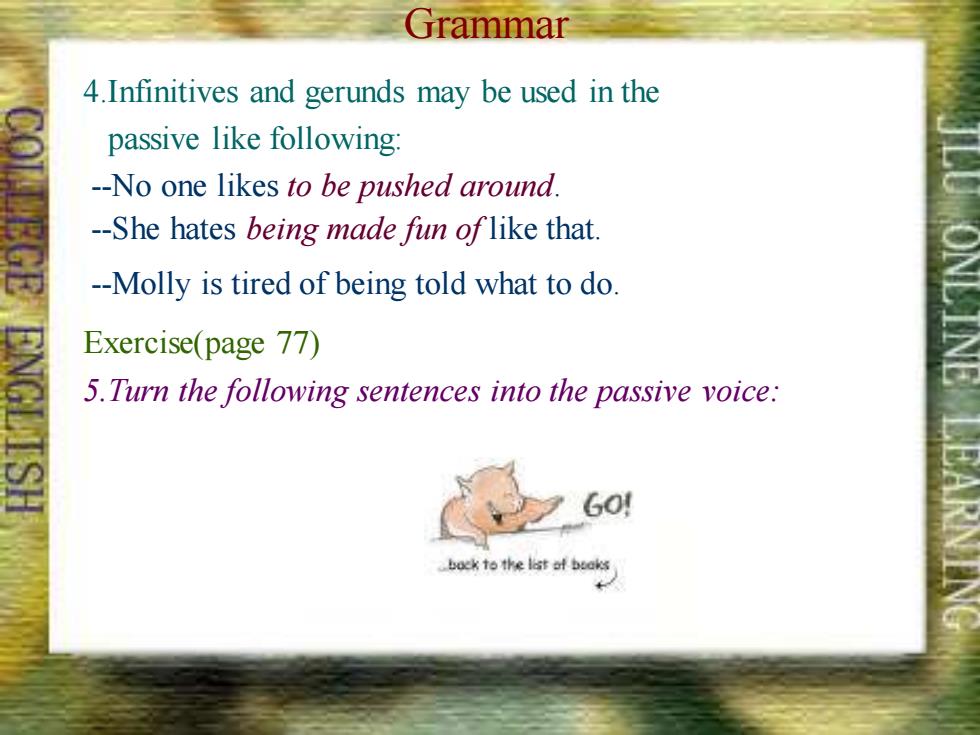
Lesson Four Grammar Pattern Drill Text A Exercise Text B
Lesson Four Grammar Pattern Drill Text A Exercise Text B

Grammar The Passive Voice(2) Exercise
Grammar The Passive Voice (2) Exercise

Grammar 1.When the verb in the passive voice takes two objects, it is more usual to make the indirect(personal)object the subject of the passive voice: Active:Xiao Li taught us (indirect object)a new song (direct object). Passive:We(subject)were taught a new song. Verbs such as give,tell,show,lend,write,pay,sell,buy. bring,make,fetch,promise and teach can take two objects. 2.Only transitive verbs may be used in the passive voice.But certain intransitive verbs can be made into transitive ones by the addition of a preposition.These verbs man be used in the passive voice.The preposition remains immediately after the verb
1.When the verb in the passive voice takes two objects, it is more usual to make the indirect (personal)object the subject of the passive voice: Active: Xiao Li taught us (indirect object) a new song (direct object). Passive: We(subject) were taught a new song. Verbs such as give, tell, show, lend,write, pay, sell, buy, bring,make, fetch,promise and teach can take two objects. 2.Only transitive verbs may be used in the passive voice .But certain intransitive verbs can be made into transitive ones by the addition of a preposition.These verbs man be used in the passive voice.The preposition remains immediately after the verb. Grammar

Grammar --This problem will be looked into by the vice chancellor of the university. --Such success was never dreamed of when we first started. --Children are well looked after in the kindergarten --Women were looked down upon in the old days. 3.In a passive sentence the doer is very often not mentioned When the doer is mentioned it is proceeded byby Active:Oi Baishi painted this picture. Passive:This picture was painted by Oi Baishi But sometimes we use prep.with --Smoke filled this room.This room was filled with smoke. --Paint covered the lock.The lock was covered with paint
--This problem will be looked into by the vice chancellor of the university. --Such success was never dreamed of when we first started. --Children are well looked after in the kindergarten --Women were looked down upon in the old days. 3.In a passive sentence the doer is very often not mentioned. When the doer is mentioned it is proceeded by by. Active: Qi Baishi painted this picture. Passive: This picture was painted by Qi Baishi. But sometimes we use prep.with --Smoke filled this room. This room was filled with smoke. --Paint covered the lock. The lock was covered with paint. Grammar

Grammar 4.Infinitives and gerunds may be used in the passive like following: --No one likes to be pushed around. --She hates being made fun of like that. --Molly is tired of being told what to do Exercise(page 77) 5.Turn the following sentences into the passive voice: Go bock to the list of boaks
4.Infinitives and gerunds may be used in the passive like following: --No one likes to be pushed around. --She hates being made fun of like that. --Molly is tired of being told what to do. Exercise(page 77) 5.Turn the following sentences into the passive voice: Grammar

Grammar 1)Craftsmen in China make 1)Many beautiful many beautiful objects out of objects in China are made out paper. of paper 2)They turned my offer down. 2)My offer was turned down 3)Somebody left the light on 3)The light was left on all all night night. 4)The fire destroyed many 4)Many valuable paintings valuable paintings were destroyed by(in)the fire. 5)Nobody has ever spoken to 5)I have never been spoken to like that before me like that before. 6)I'd like to be read to 6)I'd like someone to read to me
1)Many beautiful objects in China are made out of paper. 2)My offer was turned down. 3)The light was left on all night. 4)Many valuable paintings were destroyed by(in) the fire. 5)I have never been spoken to like that before. 6)I’d like to be read to 1)Craftsmen in China make many beautiful objects out of paper. 2)They turned my offer down. 3)Somebody left the light on all night. 4)The fire destroyed many valuable paintings 5)Nobody has ever spoken to me like that before. 6)I’d like someone to read to me. Grammar

Grammar 7It's time someone told him 7)It's time he was told what what is wrong. is wrong 8)Do you intend us to take 8)Do you intend your your remark seriously? remark to be taken seriously? 9)How can we make the roads 9)How can the roads be safe? made safe? 10)That is a good idea,but can 10)That is a good idea,but we carry it out in practice?can it be carriedouin practice? 11)You must not throw away empty bottles. 11)Empty bottles must not be thrown away. 12)We must teach young 12)Young children must be children how to cross the taught how to cross the road road safely. safely
7)It’s time someone told him what is wrong. 8)Do you intend us to take your remark seriously? 9)How can we make the roads safe? 10)That is a good idea,but can we carry it out in practice? 11)You must not throw away empty bottles. 12)We must teach young children how to cross the road safely. 7)It’s time he was told what is wrong. 8) Do you intend your remark to be taken seriously? 9)How can the roads be made safe? 10)That is a good idea,but can it be carried out in practice? 11)Empty bottles must not be thrown away. 12)Young children must be taught how to cross the road safely. Grammar

Grammar 13)You must write your 13)Your answers must be answers on one side of the written on one side of the paper only. paper only. 14)People should make lessons 14)Lessons should be more interesting for made more interesting for children. children. 15)People ought not to talk 15)Such things ought not to be talked about in public about such things in public. G01 bock to the lstbeeg
13)You must write your answers on one side of the paper only. 14)People should make lessons more interesting for children. 15)People ought not to talk about such things in public. 13)Your answers must be written on one side of the paper only. 14)Lessons should be made more interesting for children. 15)Such things ought not to be talked about in public. Grammar

Grammar 6.Complete the sentences with a passive construction,using the verbs given and in the form suggested,and adding a suitable preposition,e.g. Much of London (destroy)---fire in the seventeenth century.(Past Indefinite) Much of London was destroyed by fire in the seventeenth century. 1)America (discover)---the end of the end of the fifteenth century.(Past Indefinite) America was discovered at the end of the fifteenth century. 2)I'm not accustomed to (treat)---that way.(Gerund) I'm not accustomed to being treated that way
6.Complete the sentences with a passive construction,using the verbs given and in the form suggested,and adding a suitable preposition,e.g. Much of London (destroy)---fire in the seventeenth century. (Past Indefinite) Much of London was destroyed by fire in the seventeenth century. 1)America (discover)---the end of the end of the fifteenth century. (Past Indefinite) 2)I’m not accustomed to (treat)---that way.(Gerund) America was discovered at the end of the fifteenth century. I’m not accustomed to being treated that way. Grammar

Grammar 3)The results of the examination (not know)---two months.(Future) The results of the examination will not be known for two months. 4)All new models of this car (equip)---safety belts.(Future) All new models of this car will be equipped with safety belts. 5)A great deal of research (do)---the possible causes of cancer. (Present Perfect) A great deal of research has been done into (or for)the possible causes of cancer
3)The results of the examination (not know)---two months. (Future) 4)All new models of this car (equip)---safety belts. (Future) 5)A great deal of research (do)---the possible causes of cancer. (Present Perfect) The results of the examination will not be known for two months. All new models of this car will be equipped with safety belts. A great deal of research has been done into (or for) the possible causes of cancer. Grammar